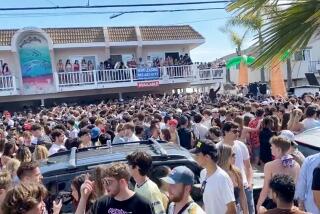College Bars Any More Concerts by the Grateful Dead
- Share via
Bowing to complaints about concert-goers’ traffic, loitering and public urination, Cal State Dominguez Hills has decided never to invite the Grateful Dead rock band back to its campus.
The band, which has a devoted following harking back to its roots in the counterculture of the 1960s, drew crowds of 30,000 to concerts on campus Saturday and Sunday.
“The concert on the campus was peaceful, . . . but it is important to us that we be a good neighbor to the Carson community,” said university spokesman Richard Turner.
“In the interest of good relations . . . we have decided not to invite the Grateful Dead back to our campus,” he said.
The band was asked not to return to the Irvine Meadows Amphitheatre in Orange County after three concerts there in April, 1989, resulted in 91 arrests, including some stemming from clashes with security forces. However, the band expects to return to the Forum in Inglewood this year despite the death of an LSD-intoxicated fan in police custody during a three-day stand there last December.
Turner said university president Robert C. Detweiler decided late Sunday afternoon against inviting the band back after receiving a briefing from the captain of the Carson sheriff’s station about community complaints.
“That’s probably best,” Carson Mayor Vera Robles DeWitt said, “because our neighborhoods are up in arms about it.”
DeWitt said she had received calls about fans “parking all over the place, 40-minute (delays) to get from the freeway to residents’ homes, urinating in public.”
Turner said other large-scale events, including circus performances, reggae and gospel music festivals, and bicycle races had been staged on campus at the Velodrome without incident.
But the Grateful Dead concert was the largest.
“We never had a concert of this size on the campus,” Turner said. “We have never had 30,000 people two days in a row.”
Law-enforcement officials praised the behavior of the crowd at the concert. About 20 undercover officers made more than 50 drug-related arrests, many for possession of hallucinogens like LSD, but none for more serious crimes.
A young woman allegedly took LSD outside the concert Saturday night, ran a red light in Manhattan Beach and broadsided another car, killing a pregnant woman and her fetus. Heather Tolles, 19, of South Pasadena was charged Tuesday with two counts of second-degree murder in the incident.
University officials said their decision to ban future Grateful Dead concerts was not related to the accident.
In an attempt to avoid the rowdiness that has plagued a number of Dead concerts across the nation, university officials and Bill Graham Productions Inc., the concert promoter, had taken special precautions, hiring 350 crowd control monitors and beefing up campus security with officers from other Cal State campuses and from the Sheriff’s Department.
Turner said the promoter sent Grateful Dead fans detailed information, along with their tickets, on the whereabouts of private campgrounds, motels and hotels near the campus. Parking on campus was included in the ticket price.
“We made sure people didn’t camp out in Carson. We made every attempt,” Turner said. “All the motels and hotels were full to capacity. We wanted to make sure there would be no disruption.”
The promoter put 150 portable toilets on the concert grounds and in parking lots.
The Sheriff’s Department, which provides police services for Carson under contract with the city, set up street barricades to keep concert traffic from overflowing into residential neighborhoods surrounding the campus.
But the barricades became a bone of contention.
“Neighbors felt like they were prisoners,” said Councilwoman Sylvia Muise, who lives close to the university.
“People couldn’t go to back-yard barbecues because of roads blocked off. Food orders couldn’t be delivered.”
Muise added that her neighbors told her of instances of drunkenness, nudity, urination, defecation and the display of Confederate flags in predominantly black neighborhoods.
She said she received complaints from storekeepers who decided not to open for business after finding people sleeping in front of the stores. “Many of the people who roamed the streets are not people one would want to hold up as a role model for young people,” Muise said.
Turner said the university, which has an operating budget of $50 million, netted less than $100,000 from the concert.
The next major event on campus is a bicycle race involving the U.S. National Bicycling Team, which is scheduled for Friday night at the Velodrome.
More to Read
Sign up for Essential California
The most important California stories and recommendations in your inbox every morning.
You may occasionally receive promotional content from the Los Angeles Times.










